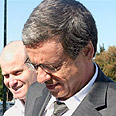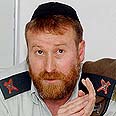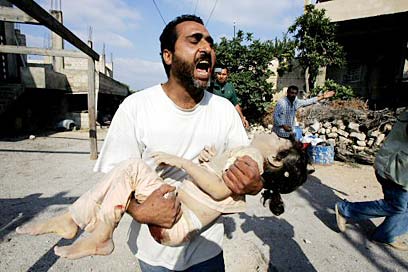

"The most legislated war in the history of Israel, maybe the world" – this is how Atorney General Menachem Mazuz characterized the Second Lebanon War. On Tuesday afternoon, the Winograd Commission published Mazuz's testimony before the investigative body, which mostly addresses the questions of legality and morality in relation to the rules of war.
During the war, the attorney general participated in closed, executive forums to which he was invited by Prime Minister Ehud Olmert. According to Mazuz, it would have been easier for him had he only been asked to express his opinion, and thus leave the decisions to military and political leaders. But this was not enough: the latter required his presence.
Mazuz said that in the current state of affairs, the substantial presence of the Military Advocate General is felt in almost every center of decision making in the armed forces. "And this represents some sort of process which peaked during the Lebanon war," Mazuz said.
The commission members inquired as to whether or not the attorney general encountered the request to approve a "tie-breaker" operation, with problematic implications for the citizens on the other side. He remembered a minister or two who put forth some rather severe suggestions, but not the defense minister (Amir Peretz) or military officials. "Today I think that the rules of the game are more or less understood and I can not identify any confrontation or claims that the legal establishment is disturbing (the army) or holding it back or anything like that."
Open discussions and arguments
Regarding behind the scenes goings-on during the war, Mazuz related his personal impression: "There was an attempt to maintain an organized decision-making process and there were a lot of discussions… for a limited military action. My impression was that the discussions were open, which is to say that it was possible to express differences of opinion, and that there were at times rifts among the ranks."

"There were things we did not know." (Photo: Reuters)
Specifically, Mazuz denied the accusations that the bombings of the Shiite neighborhood of Dahiyeh in Beirut and Kafr Qana constituted war crimes. "The test of proportionality is not one of results," he explained. "Naturally, everyone understands that the fog of war pervades battle, and there is always a not insignificant amount of missing information and uncertainty. The assumption is that decisions are made in good faith on the basis of certain information and (sometimes) these decisions turn out to be mistaken – I think that for this reason the case of Kafr Qana was totally in line with international law. Afterwards, it became apparent there were things we did not know."
Mazuz also addressed the decision to go to war in the wake of the kidnapping of Israeli soldiers. He told the commission that he asked the decision makers to wait and consider, "to think in a more ordered manner," but others claimed that after a day or two Israel would lose legitimacy to act in the eyes of the Israeli and international publics.
Regarding leaks in times of political crisis, Mazuz said, "This, unfortunately, is a sweeping national disaster. It is a very difficult thing to check at any rate, and when we are dealing with political forums, it's impossible (to prevent). To investigate a leak usually requires obtaining information from the media, questioning journalists. Basically, we are thus dealing with two elements who both have some sort of immunity."
On the academic plane, Mazuz described the development of international law, from the Hague Convention, through the Geneva Protocols, pointing out that law has gone in a humanitarian direction. It now deals with what is forbidden in war, not what it permitted or desirable, and therefore it is not intended to replace military doctrines. As a rule, Mazuz said, "State sovereignty is continuously eroded, and international law is becoming a kind of pinnacle in the pyramid of norms. It is becoming the substitute for national constitutions."
A camera for every combat soldier
Chief Military Prosecutor, Brigadier-General Avihai Mandelblit also saw his testimony before the commission released today. He was asked to address whether total war against a terrorist organization is legitimate. "The answer we arrived at," he responded, "is a resounding yes. Since 2000 our answer has been that we define our conflict with Palestinian terror as an armed confrontation. And this definition - which was very, very innovative then – is today in fact accepted throughout the world."
The chief prosecutor brought up the efforts the IDF had undertaken to isolate Hizbullah members from civilians, an explicit directive of the General Staff. One of the ways in which the instruction was enforced was the dropping of hundreds of thousands of leaflets demanding that civilians flee before the coming assault.
"This was a successful warning to a population in order to protect it and is an obligation under international law," Mandelblit said. The fact that only 20-25,000 residents of the south stayed behind (out of around one million) "provided for the IDF's ability to act." Otherwise, he is convinced, Israel would lose the legitimacy to act after a few days.
Just like Mazuz, Mandelblit did not sense tension between the operational and judicial echelons: "I do not think that I am perceived as some sort of enemy running around with a whip and meting out justice."
Mandelblit also addressed the leak issue, saying that in the Defense Ministry, General Staff, and the Military Advocate General, it is permissible to administer polygraph tests in the case of suspected leaks.
Concluding his testimony, the chief prosecutor discussed the issue of national public relations, which he considers severely lacking. To correct this, Mandelblit suggested assigning a camera to a combat soldier in each platoon, which "Hizbullah does very well."
Moreover, Brigadier-General Mandelblit said he believed that the Prime Minister's Office needs to establish an organized system, experience in the ways of public relations, saying that it was not the job of the Military Spokesperson's Office.















